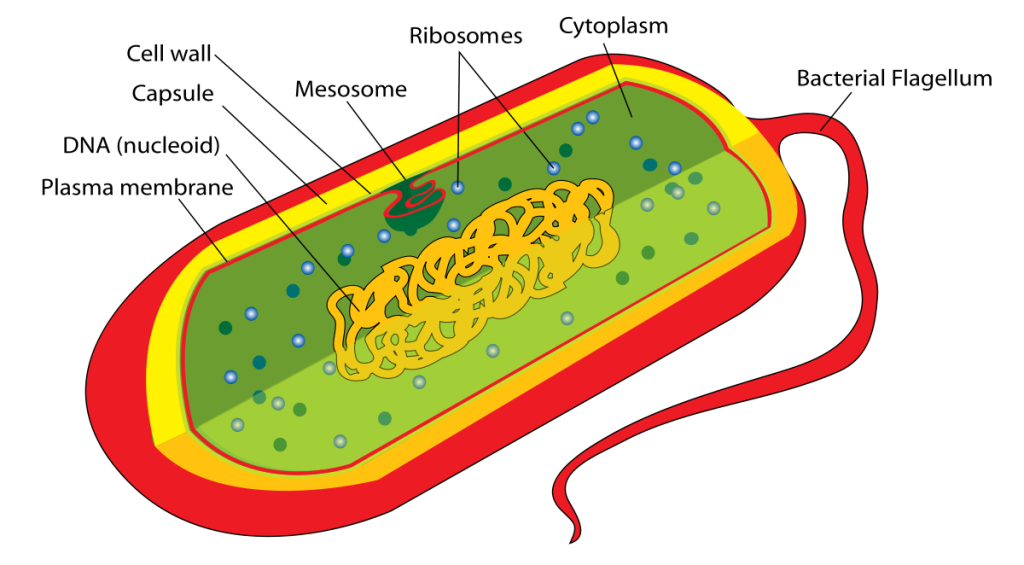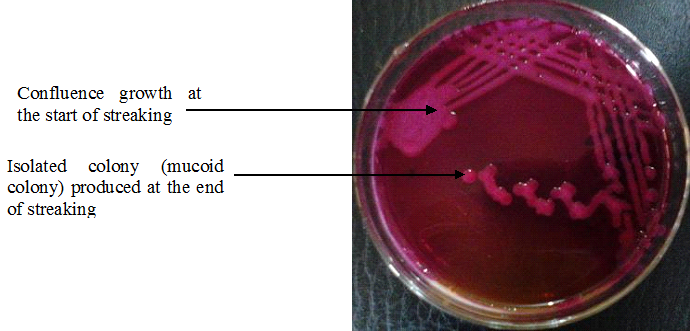Prokaryotic cells are microbial cells that have chromosomes that are not separated from the cytoplasm by a membrane. Prokaryotic cells are different from eukaryotic cells. They are cells that lack a nucleus and other membrane-enclosed organelles like mitochondrion and chloroplast et cetera. Thus everything inside the cell of a prokaryote is openly accessible within the cell, and some of them are free-floating inside the cell because they are not membrane-bound. The phrase ‘prokaryote’ is from the Greek word pro which means before and kary or cary stands for nucleus or kernel.
In general terms, prokaryote means ‘primitive cells’ in Greek; and the reason their ‘nucleus’ is said to be primitive is because their genetic material is not enclosed within a nuclear membrane (in this case: the nucleus). Their genetic material (i.e. DNA) is usually enclosed in a single circular molecule known as the nucleoid. The nucleoid of prokaryotes is not usually enclosed within a membrane (Figure 1). Based on this, both transcription and translation processes takes place and are combined in the cytoplasm as against the case in eukaryotic cells where their genetic material or DNA is enclosed within a nucleus.
The other parts of a prokaryotic cell may include flagella, cell wall, plasma membrane, fimbriae/pilus, endospores, capsules and starch granules. Microbial cells lacking a nucleus and other membrane-bound organelles such as mitochondria are generally referred to as prokaryotes. In addition to lacking membrane-bound organelles, prokaryotes also have smaller ribosomes (with sedimentation coefficient of 70S) than other non-prokaryotic cells. Basically, there are two types of prokaryotic cells and these are: Archaea and Bacteria.

Prokaryotic cells are much simpler in form or structure than the eukaryotic cells, and they possess cell walls that contain peptidoglycan. They are exceptional in carrying out nitrogen-fixation, and most prokaryotes are chemolithoautotrophs or chemolithotrophs in nature (i.e. they are capable of oxidizing certain elements or inorganic chemicals such as hydrogen, sulphur and hydrogen sulphide to generate their own energy or food). Prokaryotes that are chemolithoautotrophs play significant roles in the ecosystem in that they help in recycling matter in nature and they are also employed in leaching activities.
References
Alberts B, Bray D, Lewis J, Raff M, Roberts K and Watson J.D (2002). The molecular Biology of the Cell. Fourth edition. New York, Garland, USA.
Berg JM, Tymoczko JL, Stryer L (2002). Biochemistry (5th ed.). New York, NY: W. H. Freeman.
Brooks G.F., Butel J.S and Morse S.A (2004). Medical Microbiology, 23rd edition. McGraw Hill Publishers. USA.
Campbell, Neil A.; Brad Williamson; Robin J. Heyden (2006). Biology: Exploring Life. Boston, Massachusetts: Pearson Prentice Hall.
Cooper G.M and Hausman R.E (2004). The cell: A Molecular Approach. Third edition. ASM Press.
Dale J (2003). Molecular genetics of bacteria. Jeremy W. Dale and Simon Park (4th eds.). John Wiley & Sons Ltd, West Sussex, UK. Pp.
Karp, Gerald (2009). Cell and Molecular Biology: Concepts and Experiments. John Wiley & Sons.
Lodish H, Berk A, Matsudaira P, Kaiser C.A, Kreiger M, Scott M.P, Zipursky S.L and Darnell J (2004). Molecular Cell Biology. Fifth edition. Scientific American Books, Freeman, New York, USA.
Madigan M.T., Martinko J.M., Dunlap P.V and Clark D.P (2009). Brock Biology of microorganisms. 12th edition. Pearson Benjamin Cummings Publishers. USA. Pp.795-796.
Maton, Anthea (1997). Cells Building Blocks of Life. New Jersey: Prentice Hall.
Discover more from #1 Microbiology Resource Hub
Subscribe to get the latest posts to your email.


